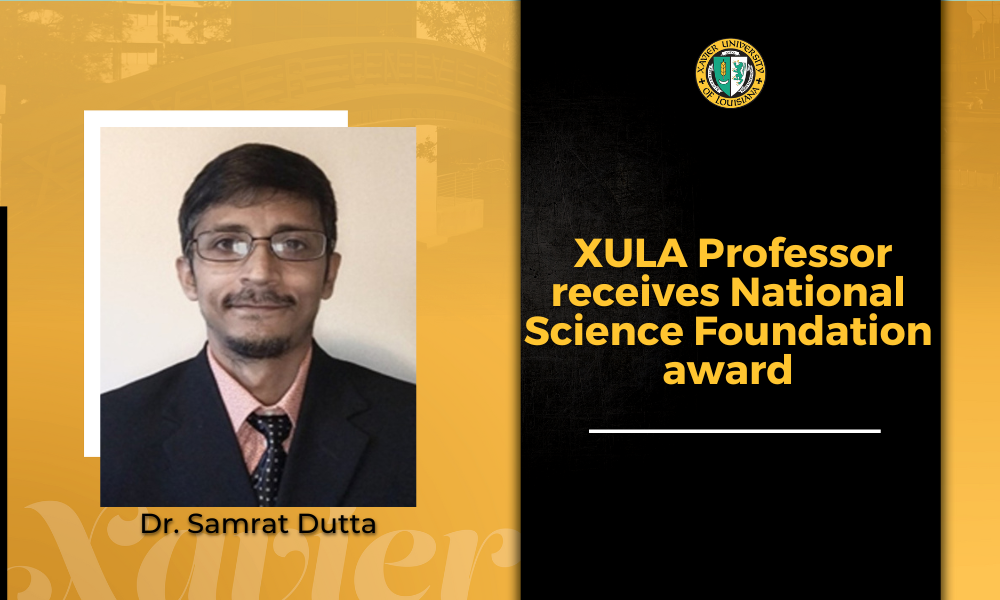In Pursuit of a Cleaner Tomorrow: XULA Professor Receives National Science Foundation Award to Study Methane Emissions

Dr. Samrat Dutta, Associate Professor in Xavier’s Department of Chemistry, received an award from the National Science Foundation (NSF) to fund his field study research through 2025. Dr. Dutta’s research, “ORE-CZ: Methane Emission from Wetlands Surrounding Lake Pontchartrain,” studies the emission of methane, a potent greenhouse gas that, according to the Environmental Defense Fund, contributes to at least 25% of today’s global warming and climate change. The research’s focal area, Lake Pontchartrain, is one of the largest wetlands along the Gulf Coast of North America. Research findings will show how wetlands contribute to global methane emissions and the factors driving gas release. The results will also provide insights to enable better wetland management and support Louisiana’s efforts toward net-zero gas emissions by 2050.
Dr. Dutta learned of the award opportunity through Xavier’s Office of Research and Sponsored Programs (ORSP). The ORSP is committed to providing exceptional service and support to Xavier’s faculty as they grow and safeguard Xavier’s research enterprise. Dr. Dutta collaborated with the National Wildlife Federation and Pontchartrain Conservancy to develop a methane emission research proposal.
“Since 2006, there has been an abnormal rise of methane in the atmosphere. It’s been indicated that the wetlands have a role in its rising, but no one is sure how much,” said Dr. Dutta. “The idea is to study emissions and their local connection so that we can have a better idea about the wetlands surrounding Lake Pontchartrain and its contribution to our environment.”
His research award also coincides with programs at Xavier, such as the Gulf Scholars Program, which aims to educate, enrich, and empower undergraduate students to practice active leadership in the survival and sustainability of the Gulf’s natural and human resources. The Gulf Scholars program synergizes with Dr. Dutta’s research as some of the students in the Gulf Scholars program will work alongside him in conducting methane research.
Dr. Dutta’s research project will be one of the first to assess the connection between methane emissions in the Gulf of Mexico and its environmental factors. He is proud of the research award as it will also be one of Xavier’s first Earth science research experiments. The purpose of this research is to learn about soil geochemistry in relation to greenhouse gases to create a better understanding of Earth’s changing environments.
The award includes grant funding for a methane gas instrument. The portable infrared device will allow students to arrive at geolocated stations and place the tool in the soil to collect methane data. The instrument will also be available for use by Xavier faculty.
Dr. Dutta and his team plan to integrate their research findings into the largest framework of carbon cycling from the wetlands. The research will modify existing methane collection protocols, test soil characteristics, survey heavy metal contamination, and assess the wetland’s biological activity.
He is excited to conduct his methane research as it offers him an opportunity to observe wetlands and investigate environmental studies. His research findings will also play a role in future environmental strategies in Louisiana.
“As there are plans to dredge Lake Pontchartrain by 2050, this research is pertinent to Louisiana and can make an immediate impact on policymakers,” said Dr. Dutta. “To be part of this makes a difference in the local community and is part of Xavier’s mission to create a humane society.”
Dr. Dutta was also delighted to receive the NSF award as this new research varies from his usual subject manner. His everyday research encompasses a wide range of studies, including dissolved gases with ionic liquids and their behavior at interfaces. The core of his research studies is understanding ionic liquids on a molecular and microscopic level. His methane research allowed him to apply his studies to a new field, and he was honored to be acknowledged for his research.
“I’m elated for my work to be recognized by experts and to know that what I’m proposing is doable and is going to make a difference in the local and global community. I’m very excited to be part of a solution for the environment,” said Dr. Dutta.
Dr. Dutta explained that there are not currently many people of color in environmental science careers. He is hopeful this research can set into motion opportunities to create future environmental leaders and diversify the environmental science field. He is also hopeful this research will be a stepping stone for creating Earth science concentrations and more field study opportunities at Xavier.
“As there is no environmental science program at Xavier, this research bridges that gap. Field study opportunities and research provide hands-on, interdisciplinary education and environmental research for our students,” said Dr. Dutta. “It provides an opportunity for students to immerse themselves in the experience and work of a field scientist. In doing so, it also exposes students to practical environmental science and opens new career opportunities.”
Dr. Dutta’s research is driven by the quest to make the world a better place. His research project will expand on core ideas to create a clean environment for current and future generations.